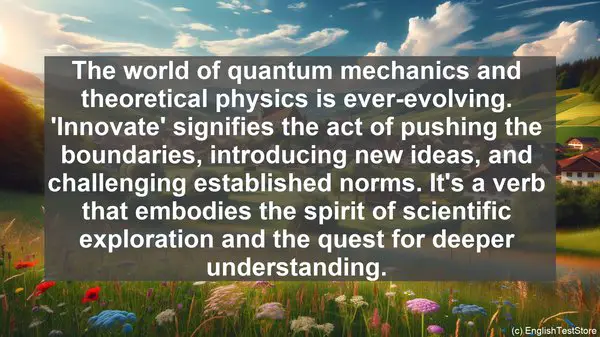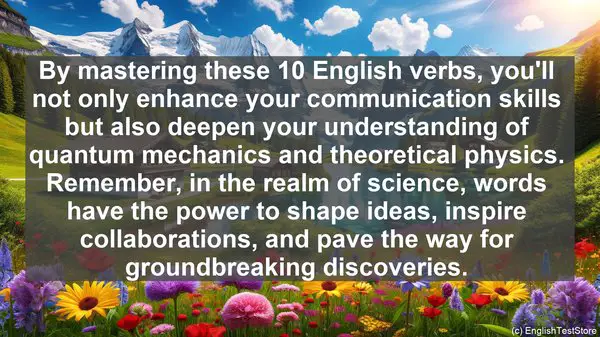Introduction: The Power of Verbs in Scientific Conversations
Greetings, students! In the world of quantum mechanics and theoretical physics, effective communication is key. And at the heart of communication lies verbs. Verbs not only convey actions but also shape the very essence of scientific discussions. Today, we’ll explore the top 10 English verbs that will elevate your conversations in this fascinating realm.
1. Analyze: Delve Deep into the Data
Quantum mechanics and theoretical physics are built on data. To truly understand and interpret this data, you need to analyze it. Whether it’s scrutinizing experimental results or dissecting complex equations, the verb ‘analyze’ is your go-to. It signifies a meticulous examination that often leads to groundbreaking insights.
2. Predict: Unravel the Future Possibilities
One of the thrilling aspects of quantum mechanics and theoretical physics is the ability to predict. From the behavior of subatomic particles to the evolution of the universe, ‘predict’ allows you to make educated guesses based on established theories and models. It’s a verb that embodies the essence of scientific exploration.

3. Derive: Extracting Knowledge from Principles
In the realm of quantum mechanics and theoretical physics, many concepts are derived from fundamental principles. ‘Derive’ signifies the process of extracting knowledge, often through logical deductions and mathematical calculations. It’s a verb that showcases the interconnectedness of various scientific ideas.
4. Communicate: Sharing Ideas and Insights
Science is a collaborative endeavor, and effective communication is vital. Whether it’s presenting your research findings or discussing a complex theory, ‘communicate’ ensures your ideas are conveyed clearly and concisely. It’s not just about speaking; it’s also about active listening and engaging in meaningful discussions.
5. Simulate: Creating Virtual Laboratories
In some cases, conducting physical experiments may be challenging. That’s where ‘simulate’ comes in. Through advanced computer models and simulations, you can recreate complex scenarios, observe their outcomes, and gain valuable insights. It’s a verb that opens up new avenues for experimentation.
6. Collaborate: Joining Forces for Scientific Progress
The frontiers of quantum mechanics and theoretical physics are often tackled by teams, not individuals. ‘Collaborate’ signifies the act of working together, pooling resources, and sharing expertise. It’s a verb that highlights the collective nature of scientific advancements.
7. Validate: Ensuring Accuracy and Reliability
In the realm of science, accuracy is paramount. ‘Validate’ represents the process of confirming the correctness and reliability of a theory, an experiment, or a model. It involves rigorous testing, meticulous analysis, and peer review. It’s a verb that upholds the integrity of scientific knowledge.
8. Generalize: Extending Findings to Broader Contexts
A scientific discovery or a theory often has implications beyond its immediate scope. ‘Generalize’ signifies the act of extending findings, concepts, or principles to broader contexts. It’s a verb that demonstrates the far-reaching impact of scientific research.
9. Debate: Engaging in Intellectual Discourse
Science is not just about facts; it’s also about questioning, challenging, and debating. ‘Debate’ represents the intellectual discourse that drives scientific progress. It’s a verb that encourages critical thinking and the exploration of alternative perspectives.
10. Innovate: Pushing the Boundaries of Knowledge
The world of quantum mechanics and theoretical physics is ever-evolving. ‘Innovate’ signifies the act of pushing the boundaries, introducing new ideas, and challenging established norms. It’s a verb that embodies the spirit of scientific exploration and the quest for deeper understanding.

